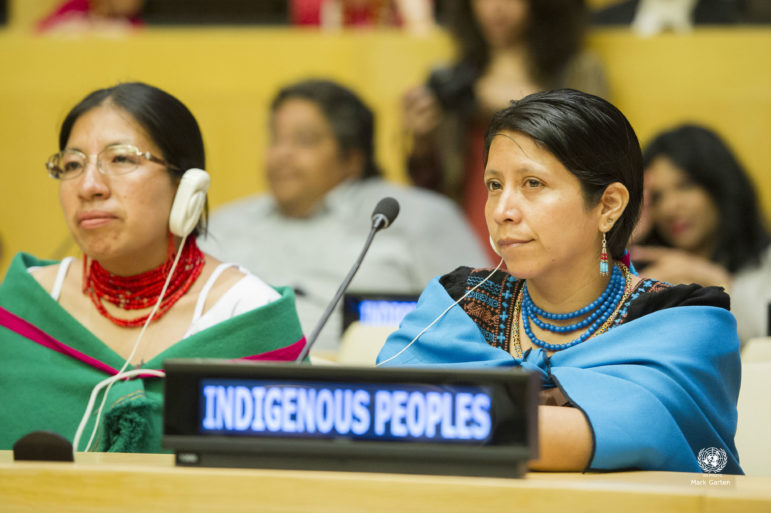
Photo: UN Photo/Rick Bajornas
Guide
GIJN/NAJA Guide for Indigenous Investigative Journalists
This guide is created to encourage Indigenous investigative journalists and to provide empowering tips and tools. Developed collaboratively by the Global Investigative Journalism Network (GIJN) and the Native American Journalists Association (NAJA), the guide explores eight key topics.The entries include background information, examples of investigative work, suggestions for stories, and resources for information.
This guide was written by GIJN Resource Center Director Toby McIntosh. NAJA editors were Sterling Cosper and Rebecca Landsberry. GIJN editing by Gaelle Faure, David Kaplan, Anne Koch, and Tanya Pampalone. Thanks to many others for suggestions, including: Tristan Ahtone, Stephanie Russo Carroll, Christopher Cunneen, Mary Hudetz, Ted Gest, and Tahu Kukutai.
We welcome suggestions for expanding and updating this resource. Please write to us here.
The Global Investigative Journalism Network is an international association of journalism organizations that support the training and sharing of information among investigative and data journalists—even in repressive regimes and marginalized communities. GIJN’s membership comprises 182 nonprofits in 77 countries, and its mission includes sponsoring global and regional conferences, training, providing resources and advice, and promoting best practices in investigative and data journalism. The GIJN Help Desk has provided assistance to over 7,000 journalists in 100 countries, while GIJN’s regional editors spread the latest news in eight languages a day.
 The Native American Journalists Association serves and empowers Native journalists through programs and actions designed to enrich journalism and promote Native cultures. NAJA recognizes Native Americans as distinct peoples based on tradition and culture. In this spirit, NAJA educates and unifies its membership through journalism programs that promote diversity and defends challenges to free press, speech, and expression. NAJA is committed to increasing the representation of Native journalists in mainstream media. NAJA encourages both mainstream and tribal media to attain the highest standards of professionalism, ethics, and responsibility.
The Native American Journalists Association serves and empowers Native journalists through programs and actions designed to enrich journalism and promote Native cultures. NAJA recognizes Native Americans as distinct peoples based on tradition and culture. In this spirit, NAJA educates and unifies its membership through journalism programs that promote diversity and defends challenges to free press, speech, and expression. NAJA is committed to increasing the representation of Native journalists in mainstream media. NAJA encourages both mainstream and tribal media to attain the highest standards of professionalism, ethics, and responsibility.
Chapters
Chapter Guide Resource
Data Journalism on Indigenous Communities
The absence or poor quality of data on Indigenous communities presents both challenges and opportunities for data journalism.
Chapter Guide Resource
Land Ownership: Community Rights Under Threat
The claims by Indigenous peoples to the land on which they farm, graze animals, hunt and live are often unrecognized, tenuous, and vulnerable.
Chapter Guide Resource
Investigating Criminal Justice
Challenges faced by Indigenous people in accessing justice systems, including discriminatory and prejudicial attitudes against Indigenous peoples and their systems of justice.
Chapter Guide Resource
Exposing Exploitation and Corruption
This GIJN/NAJA resource covers techniques for investigating corporations, contracts, development projects, and payments by extractive industries to governments.
Chapter Guide Resource
Covering the Climate Crisis
From the tropics to the Arctic, Indigenous peoples are on the front lines of the climate crisis, and investigative reporting is critical to tell their stories.
Chapter Guide Resource
Investigating Murdered or Missing Persons
Attacks on Indigenous people worldwide are an important focus for investigative journalism. This chapter provides examples of good journalistic work done in this area.
Chapter Guide Resource
Indigenous Data Sovereignty
For Indigenous peoples worldwide, the lack of good data about their communities and their limited control over the collection and use of the data have serious consequences.
Chapter Guide Resource
Getting Documents, Dealing with Whistleblowers, and Staying Safe
This section of the GIJN/NAJA guide covers how to make official requests for information, how to work with whistleblowers, and how to protect yourself.
Chapter Guide Resource
GIJC23 Indigenous Investigations Webinar
Hear from Indigenous journalists from Canada, Taiwan, and the United States who are using investigative skills to expose issues ranging from land theft to cultural repression.








